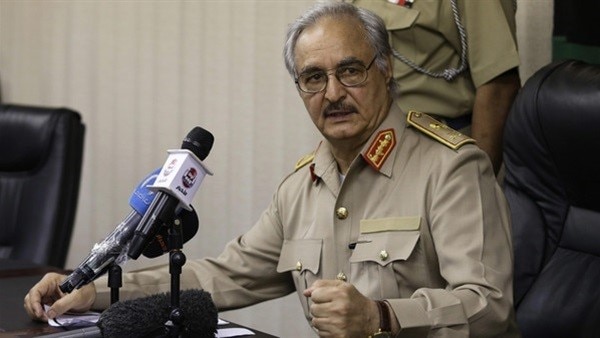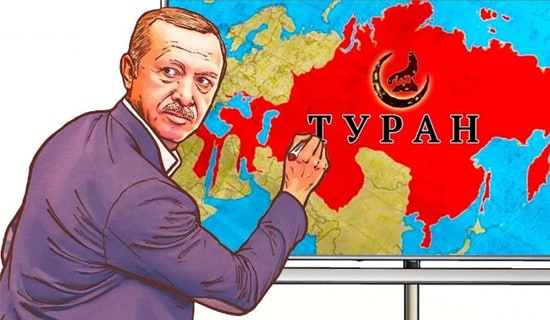On January 11, 2017, Libyan National Army commander Marshal Khalifa Haftar paid a visit to the Russian aircraft carrier Admiral Kuznetsov,[1] which had anchored near Benghazi en route home from Syria. Aboard the vessel, Haftar conducted a video conference with Russian Defense Minister Sergey Shoigu on the subject of terrorism in the Middle East.[2] It was also reported that wounded soldiers from Haftar's forces were recently flown to Russia for treatment.[3]
Media worldwide reported that during his visit to the Admiral Kuznetsov, Haftar had signed an agreement for a supply of $1.5 billion in Russian arms, despite a UN weapons embargo. However, the Libyan National Army has denied that Haftar signed any arms deal with Russia.[4] A report in the Russian daily Nezavisimaya Gazeta stated that Haftar needs Russian heavy weaponry, but that Moscow will not provide it, in order not to inflame the situation vis-à-vis the U.S. and E.U.[5]
Russia has also denied conducting talks on establishing military bases in the cities of Tobruk and Benghazi. Media worldwide have reported that Haftar signed an agreement reflecting Russia's interest in opening bases in Libya. However, Viktor Ozerov, head of the Russian Federation Council's defense committee, denied such claims.[6]
It is worth noting that Haftar visited Moscow on November 29, 2016 and also on June 28, 2016. In June, he met with Russia's Special Presidential Representative for the Middle East and Africa and Deputy Foreign Minister Mikhail Bogdanov, and during his November visit he met with Russian Foreign Minister Sergey Lavrov.[7]
Below are excerpts from an article titled "The Marshal's Knowledge" and published by the Russian daily Kommersant, on the relations between Haftar and Russia:[8]

Khalifa Haftar (Source: El-balad.com)
"Libya Is Already Becoming One Of The Obligatory Subjects In The Dialogue Between Russia And The EU"
"With the Russian operation in Syria, Moscow's activity in another country, Libya (also a survivor of the 'Arab Spring'), has gone almost unnoticed. However, this activity is unprecedented – since the times of Muammar Gaddafi, Russia has not been so determinedly and pointedly focused on Libyan affairs. In the chaos that has spread over the country, which, in fact, has become divided into separate parts, the Kremlin seems to have chosen a privileged partner to place its stake on. This man is Marshal Khalifa Haftar, commander of the armed forces that control a large part of the province of Cyrenaica in eastern Libya.
"From Moscow's point of view, Marshal Haftar seems to be a promising partner for several reasons.
"Firstly, there are real forces behind him. And the territory where his influence extends today is larger than the territory de facto controlled by the internationally recognized 'Government of National Accord,' based in Tripoli and headed by the Prime Minister Fayez al-Sarraj.
"Secondly, it is Marshal Haftar who controls major oil deposits (the so called 'oil crescent'), as well as ports through which energy materials are exported.
"Thirdly, of all the groups engaged in the Libyan conflict, it is Marshal Haftar's army that represents the most secular and moderate forces fighting against the Islamists. One cannot say the same about Fayez al-Sarraj's government: it has introduced the Sharia law in the country.
"Fourthly, among the regional players who support Khalifa Haftar is Egypt, which has recently become one of Russia's key partners in the Middle East and Africa. Cairo's alliance with the Marshal allows one to provide him any necessary aid via the Egyptian territory, avoiding accusations of violating the UN arms embargo on Libya.
"And finally, Khalifa Haftar twice received training in the former USSR: according to our information, he took the Higher Officers Training Course 'Vystrel' in 1977-1978, and studied in the Frunze Military Academy in 1983. This fact of the Marshal's biography makes dialogue with him so much easier.
"And this dialogue is becoming more active. Last year, Marshal Haftar visited Moscow twice (in June and November) and met with the Defense Minister Sergey Shoigu, Foreign Minister Sergey Lavrov, Secretary of the Security Council of Russia Nikolai Patrushev, and special representative of the President on the Middle East and Africa Mikhail Bogdanov. In addition, in January this year, Khalifa Haftar went aboard the Russian aircraft carrier Admiral Kuznetsov, which was coming back from Syria.

Marshal Khalifa Haftar on board the Russian aircraft carrier Admiral Kuznetsov off the coast of Libya, in the Mediterranean Sea. See video Libyan Commander Visits Russian Aircraft Carrier Admiral Kuznetsov
"If Marshal Haftar manages to take under control new territories, especially in the coastal area, with the help of Russia and Egypt, this will make him de facto the most influential field commander in the country. Neither Fayez Al-Sarraj's government, which does not even fully control the situation in the capital, nor the alternative parliament in Tobruk (which formally supports the marshal) can compete with him.
"Libya is already becoming one of the obligatory subjects in the dialogue between Russia and the EU. The head of the European diplomacy, Federica Mogherini, during a recent telephone conversation with Sergey Lavrov, gave special priority to the subject of Libya. If this tendency continues and intensifies, Moscow will become an inevitable partner in the resolution of the Libyan (and not just Syrian) crisis in the eyes of Brussels (and in the longer term, Washington).
"It is too early to say what dividends (if any) can be derived from this development. But it is difficult to imagine that this factor will not be taken into account when the EU leaders will have to decide in May-June whether to extend the sanctions against Russia for another six months, and when the people in the key European capitals (especially in Paris, where there will soon be a new president, and in Rome, where they pay special attention to the Libyan problem) start rethinking their strategy vis-à-vis Russia and adapt it to new realities."
[1] See MEMRI Special Dispatch No. 6655, The 'Admiral Kuznetsov' Aircraft Carrier - Mission And Goals (An Update), October 27, 2016; See MEMRI Special Dispatch No. 6659, Ria Columnist: 'Admiral Kuznetsov' Aircraft Carrier Is Directed Against 'The Terrorists More Technologically Advanced Puppet Masters [The West]', November 1, 2016; See MEMRI Special Dispatch No. 6687, The Russian Media Outlet Lenta.ru Tells The Story Of Russia's Lone Aircraft Carrier, The 'Admiral Kuznetsov,' November 21, 2016; See MEMRI Special Dispatch No. 6741, 'Admiral Kuznetsov' Aircraft Carrier Left Syria's Shores – Russian Chief Of Staff Valery Gerasimov: We Are Diminishing Our Military Presence In Syria, January 16, 2017.
[2] Eng.mil.ru, January 11, 2017.
[3] Sputniknews.com, February 22, 2017.
[4] Libyaherald.com, January 18, 2017.
[5] Ng.ru, January 19, 2017.
[6] Sputniknews.com, January 22, 2017.
[7] Mid.ru, November 29, 2016; Mid.ru, June 28, 2016.
[8] Kommersant.ru, February 20, 2017. The article is by Russian political analyst Maksim Yusin.





